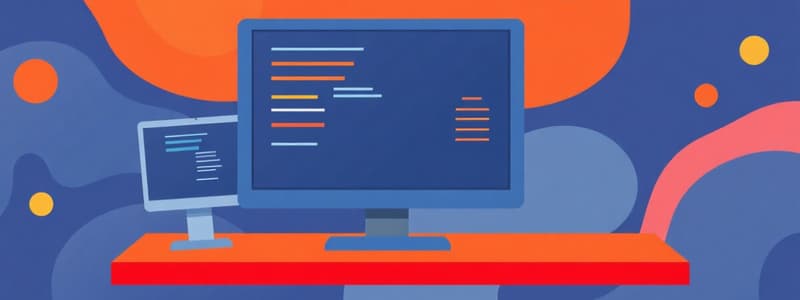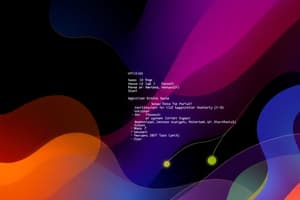Podcast
Questions and Answers
What is one function of memory management in an operating system?
What is one function of memory management in an operating system?
- Increases processing speed
- Ensures processes stay within memory boundaries (correct)
- Stores user data permanently
- Handles graphical interface rendering
Which component of an operating system is responsible for organizing and accessing files?
Which component of an operating system is responsible for organizing and accessing files?
- Application Program Interface
- File System (correct)
- User Interface
- I/O System
What role does the user interface play in an operating system?
What role does the user interface play in an operating system?
- Defines file storage methods
- Controls memory allocation
- Manages hardware communication
- Allows the user to access programs and change settings (correct)
Which operating system is NOT listed among mobile operating systems?
Which operating system is NOT listed among mobile operating systems?
What does the Application Program Interface (API) provide?
What does the Application Program Interface (API) provide?
What are the two primary components of software?
What are the two primary components of software?
Which of the following is an example of system software?
Which of the following is an example of system software?
Which category of software enables users to perform specific tasks?
Which category of software enables users to perform specific tasks?
What is the role of utility programs in system software?
What is the role of utility programs in system software?
Which of the following programming languages is often used for high-level programming?
Which of the following programming languages is often used for high-level programming?
What does an operating system primarily coordinate?
What does an operating system primarily coordinate?
What is a virtual machine in the context of software?
What is a virtual machine in the context of software?
Which operating system is NOT considered a desktop operating system?
Which operating system is NOT considered a desktop operating system?
Flashcards are hidden until you start studying
Study Notes
Software
- Software is the programs and data that a computer uses
- Programs are lists of instructions for the processor
- Data can be any information the program needs: character data, audio data, numerical data, image data.
- Both programs and data are saved in computer memory
Types Of Software
- Computer software is divided into three main categories: system software, application software, and programming languages
- System software manages computer resources and makes computers easier to use
- Operating System is a system software that manages computer resources and controls the running of user programs.
- Utility programs allow the user to perform maintenance tasks usually related to managing a computer, its devices or its programs
- Application software enables a computer user to do a particular task
- Programming languages are used in computer programming to implement algorithms.
- Most programming languages consist of instructions for computers.
Virtual Machine
- The set of services and resources created by the software and seen by the user is called a virtual machine
- The programmer shouldn't need to know about registers, circuits, or memory addresses but instead should see a virtual machine that “understands” programming symbols like + and =.
Software Components
- System software includes: operating systems, networking systems, and utility programs
- Application software includes: website servers, word processors, game programs, spreadsheets, databases, and graphics programs
- Programming languages include: assembly, VisualBasic, Pascal, C++, Java, and Python
Operating Systems
- Operating Systems (OS) are a group of programs that coordinate the operation of all the hardware and software components of the computer system.
- Some jobs Operating Systems perform include: scheduling jobs to be processed by the CPU and managing resources such as memory, I/O, and data transfer.
- Examples of desktop operating systems include: MS-DOS, MS Windows, Unix, Solaris, Linux, and macOS.
- Examples of mobile operating systems include: iOS, Android, HarmonyOS, Windows phone, and Symbian
Operating System Components
- Memory Management: allocates memory, ensures processes stay within memory boundaries, and controls virtual memory
- I/O System: communicates with peripherals and hardware components, co-ordinates I/O systems such as interrupts and direct memory access.
- File System: Organizes and accesses files, maintains user file quotas on a multi-user system, and controls file/record access.
- Application Program Interface: provides system services for applications; interface between applications and the operating system
- User Interface: allows the user access to programs, view and change system settings, and provides a consistent interface between the user and the operating system.
Studying That Suits You
Use AI to generate personalized quizzes and flashcards to suit your learning preferences.




